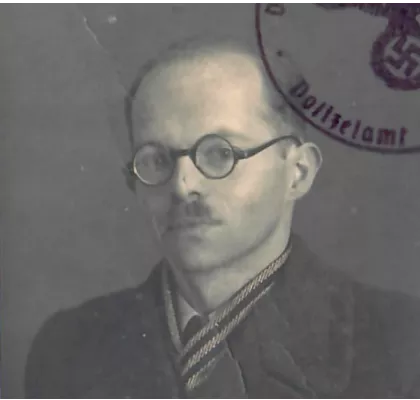Henry Frank (1918-2002)
The comedian
- © WDR
- © USHMM
„Dear Heinz, I hope you are happy and healthy. I am doing better. [...] Write often. I hope you come back soon. Lots of love and kisses from us all and mother“
This card is one of many that Anna Frankenstein wrote from the Theresienstadt ghetto in 1944, addressed to her son Heinz Frankenstein, "Work assignment Barrack Construction". Work assignment Barrack Construction stands for the labour deployment to Wulkow, a satellite camp of the Theresienstadt ghetto. Heinz was deported there in March 1944 with a group of young men to build an alternative site for the Reich Security Main Office. They had been promised that, if they co-operated, their relatives would be saved from deportation to "the East". In Wulkow, Heinz and the others were mistreated and abused by the SS. When Heinz returned to Theresienstadt in February 1945, his mother and sisters had been deported to Auschwitz.
Henry Frank was born as Heinz Frankenstein in Berlin in 1918, the youngest child in his family. Henry and his four sisters' childhood was characterised by poverty. His father Jakob, a recipient of the Iron Cross, was wounded in the First World War. As it was difficult for him to work due to illness caused by his injuries, his mother cleaned graves in a Jewish cemetery to support the family. The family was not very religious and only celebrated the main Jewish holidays. They had many friends in their mixed-religious neighbourhood and did not experience any anti-Semitism until 1933.After 1933, their lives changed: Henry had to leave his public school, and he and his four sisters began working to support the family. Henry first worked as a coal hauler for the neighbourhood, then in an ammunitions factory.
After the German invasion of Poland, Henry's eldest sister Dorothea and her family fled to England. The remaining Frankenstein family felt unable to leave Berlin. When Henry, his mother and his two sisters Inge and Irene were deported to the Theresienstadt ghetto at the end of May 1942, his father Jakob and his sister Gerda were no longer alive. Gerda had been deported to the Warsaw ghetto with her family a month earlier, in April 1942, and was murdered in the Baltic territories. Henry's father was murdered in retaliation for the arson attack by two communist resistance groups on the propaganda exhibition "Das Sowjet-Paradies" ("The Soviet Paradise"). One week before Henry, his mother and two sisters were deported, the father and 500 other men were arrested by the Gestapo "as hostages", taken to Sachsenhausen concentration camp and shot there at the end of May.
In the Theresienstadt ghetto, Henry initially worked as a nurse in the ghetto hospital and later in a psychiatric institution. In Wulkow, Henry was popular with his fellow inmates due to his "Berliner Schnauze", his sense of humour and his little cabaret shows. He was, however, severely abused by the commandant Franz Stuschka. During this time, his sister Irene was deported to Auschwitz in October 1944 due to illness. His mother volunteered to accompany her. When his sister Inge, who had initially stayed behind, managed to follow them a few days later, they had already been murdered in the gas chambers. Inge was taken to Oederan, a satellite camp of Flossenbürg, and forced to work in an ammunitions factory. In March 1945, one month after his return to Theresienstadt, Henry was sent to a camp in Schnarchenreuth near the town of Hof to do renovation work on accommodation. Just one month later, he and around 200 other prisoners made their way back to Theresienstadt on foot, where the survivors of the march arrived on 20 April 1945. One day later, he met his surviving sister Inge again, whom he hardly recognised.
When Theresienstadt was liberated by the Red Army on 08 May, Henry and Inge were unable to leave the camp immediately due to a typhoid epidemic. The American army took the siblings to the Deggendorf displaced persons camp. An accident on the way there left Henry with a broken rib. Henry remained in Deggendorf until he emigrated to the United States in the spring of 1946. His sister Inge also stayed there until she left for England in September 1946, from where she moved to live with her sister Dorothea on a small Scottish farm. Inge also moved to the USA in November 1949. Despite not speaking English, Henry got a job in the USA as a machine fitter in a factory. Later, he worked in the meat wholesale trade. While there, he changed his name to Henry Frank. In April 1948, he married Irene Silberstein, whom he had first met in Deggendorf. Henry and Irene had two children and moved to New Jersey. They regularly visited local schools and gave talks about their experiences during the Holocaust. Henry was actively involved in organising the reunions of the former Wulkow prisoners.
- © USHMM

